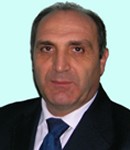
Plenary Lecture
Integration between Super Grids and Smart Grids: A Challenge for the Future

Professor Francesco Muzi
Department of Electrical and Information Engineering
University of L’Aquila
Italy
E-mail: francesco.muzi@univaq.it
Abstract: A super grid is a wide-area HHV network involving the exchange of considerable energy entities transmitted across very long distances. Throughout the world, three major super grids are presently developing: the European Super Grid, the U.S. Super Grid and the Asian Super Grid. Sometimes in the future, the European super grid is due to include the interconnection of several European countries and neighboring regions such as North Africa, Ukraine, Kazakhstan, allowing a wide sharing of the total renewable power resources. These super grids exhibit prominent, intelligence features in the transmission nodes which integrate the local smart grids present on the other side. In the last few years medium or low voltage intelligent distribution networks, the so-called smart grids, have been developed to respond to the increasing demand of electrical energy. These smart grids allow to use profitably the otherwise hard to exploit energy from renewable sources dispersed on the territory, and at the same time to improve efficiency in energy distribution, consumption and storing. Smart grids must carry out these complex functions with high reliability, energy sustainability and high security levels. An important issue to be solved in such a large, complex system consisting of a super grid and a myriad of linked smart grids is to maintain stability throughout the system. In this context, particular attention must be paid to voltage stability and to the linked reactive power that must be absorbed or supplied at each sensible node also by important, private renewable production systems. In other words, the main private energy operators must collaborate to the network voltage control. As a consequence, the liberalization of the reactive energy market will become of outmost importance in the future. Given these upcoming scenarios, the new private operators will be obliged to supply reactive energy by allocating all proper available resources efficiently, in order to obtain the most economical solution as any profitable competition requires. For this reason, rules must be given in advance, since producers need to have all the necessary information to correctly evaluate their investments. A general overview of this topic is presented and possible future scenarios are described and discussed.
Brief Biography of the Speaker: Francesco Muzi is a professor of Power Systems at the University of L’Aquila, Italy, where he has also the scientific responsibility for the Power System Group. His main research interests concern Power systems transients and dynamics, Reliability and power quality in distribution systems, Power systems diagnostics and protection. In these fields, he authored or co-authored over 100 scientific papers published in reviewed journals or presented at international conferences. He received mentions in books edited by John Wiley & Sons, New York and participated to the outline of the “IEEE Guide for improving the lightning performance of electric lines”, IEEE Standards Department, New York. He has also a patent for an industrial invention, namely “Power system controlled by a microprocessor”. He is a regional chairman of the Italian National Lighting Society and was a chairman or keynote lecturer in a number of international conferences organized by different prestigious societies. He is a technical reviewer for the following international journals: IEEE Transactions on Power Delivery, Electric Power Systems Research by Elsevier Science, IET Generation, Transmission & Distribution.